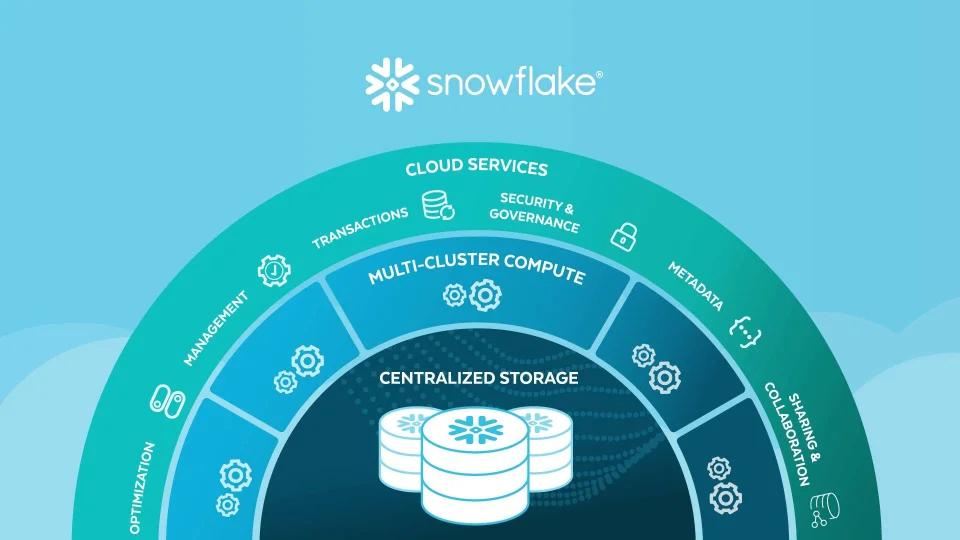
Snowflake

Snowflake
A cloud-native data platform offering independent scaling of storage and compute, secure data sharing, semi-structured data support, and rich SQL analytics in a fully managed service.

Key Features
- Elastic Compute & Storage Scalability
- Separation of Storage and Compute
- Multi-Cluster Virtual Warehouses
- Zero-Copy Cloning
- Time Travel & Data Recovery
- Secure Data Sharing & Data Marketplace
- Native Semi-Structured Data Support (JSON, AVRO, Parquet)
- Automatic Query Optimization
- Snowpipe Continuous Data Ingestion
- Streams & Tasks (Change Data Capture)
- Snowpark (Developer Data Framework)
- Dynamic Data Masking & Governance
- Multi-Cloud & Cross-Region Replication
- Role-Based Access Control & Encryption
What Is Snowflake?
Snowflake is a cloud-native data cloud that delivers data warehousing, data lake, data engineering, data science, and secure data sharing in a single platform. Built on a unique multi-cluster shared data architecture, Snowflake decouples storage and compute into distinct layers, enabling organizations to scale resources independently and pay only for what they use.
Pros and Cons
Pros
- True elasticity: compute and storage scale independently to match workload demands.
- High concurrency: multi-cluster warehouses prevent resource contention for consistent performance.
- Rich SQL support: handles structured and semi-structured data natively without ETL.
- Continuous ingestion: Snowpipe automates data loading with near real-time freshness.
- Secure sharing: share live data externally without copying, via the Data Marketplace.
Cons
- Usage-based billing can be unpredictable without diligent cost monitoring.
- Advanced capabilities (e.g., Business Critical features, Virtual Private Snowflake) carry premium pricing.
- No on-premises offering; requires reliance on public cloud providers.
- Steep learning curve for optimizing cost and performance at scale.
Who It’s For
- Analytics & BI Teams needing fast, scalable queries and seamless BI integration.
- Data Engineers building ELT pipelines and change-data-capture workflows.
- Data Scientists leveraging Snowpark for large-scale data processing in familiar languages.
- IT & Security Teams requiring enterprise-grade compliance, governance, and encryption.
- Multi-Cloud Enterprises seeking unified data management across AWS, Azure, and GCP.
Elastic Compute & Storage Scalability
Virtual warehouses can be sized and spun up or down on demand. Storage scales automatically, with separate billing, ensuring optimal performance without over-provisioning.
Zero-Copy Cloning & Time Travel
Create instant clones of databases, schemas, and tables without additional storage. Use Time Travel to query or restore data from hours or days in the past for auditing and recovery.
Secure Data Sharing & Data Marketplace
Share live, governed datasets internally or with external partners without copying data. Access third-party data via the Snowflake Data Marketplace for enriched analytics.
Snowpipe Continuous Data Ingestion
Snowpipe automatically loads data from cloud storage as soon as files arrive, enabling near real-time analytics without manual ETL orchestration.
Streams & Tasks (Change Data Capture)
Track row-level changes with streams and build serverless tasks to process new or modified data, supporting CDC patterns and event-driven architectures.
Snowpark Data Framework
Develop complex transformations and data pipelines in Python, Java, Scala, or SQL using Snowpark’s optimized execution engine, bringing compute to the data.
Dynamic Data Masking & Governance
Apply masking policies to sensitive columns, enforce role-based access control, and audit activity with comprehensive governance features built into the platform.
Multi-Cloud & Cross-Region Replication
Deploy Snowflake accounts on AWS, Azure, and GCP. Replicate data across regions or clouds for disaster recovery, business continuity, and global performance optimization.
Pricing
Snowflake offers usage-based pricing across storage and compute, with two main pricing models:
- On Demand: Pay-as-you-go credits for compute and monthly storage fees.
- Capacity: Discounted upfront capacity commitments for steady-state workloads.
Snowflake Editions (credit rates per cloud-provider unit):
- Standard Edition: $2.00/credit; core data warehousing features.
- Enterprise Edition: $3.00/credit; adds multi-cluster warehouses, data encryption, and replication.
- Business Critical Edition: $4.00/credit; includes HIPAA-grade security, account failover, and private connectivity.
- Virtual Private Snowflake: Custom pricing; isolated VPC deployment for maximum security.
Storage is billed separately (approx. $23/TB-month, compressed) with a $25 minimum monthly charge on On Demand accounts.
Verdict
Snowflake’s innovative architecture and rich feature set make it a top choice for organizations seeking scalable, performant, and secure data warehousing in the cloud. Its separation of storage and compute, coupled with powerful developer tools like Snowpark and real-time ingestion via Snowpipe, delivers unmatched flexibility. However, teams must implement cost governance practices to manage the usage-based billing model effectively.
Frequently Asked Questions about Snowflake

What Is Snowflake?
Snowflake is a cloud-native data cloud that delivers data warehousing, data lake, data engineering, data science, and secure data sharing in a single platform. Built on a unique multi-cluster shared data architecture, Snowflake decouples storage and compute into distinct layers, enabling organizations to scale resources independently and pay only for what they use.
Pros and Cons
Pros
- True elasticity: compute and storage scale independently to match workload demands.
- High concurrency: multi-cluster warehouses prevent resource contention for consistent performance.
- Rich SQL support: handles structured and semi-structured data natively without ETL.
- Continuous ingestion: Snowpipe automates data loading with near real-time freshness.
- Secure sharing: share live data externally without copying, via the Data Marketplace.
Cons
- Usage-based billing can be unpredictable without diligent cost monitoring.
- Advanced capabilities (e.g., Business Critical features, Virtual Private Snowflake) carry premium pricing.
- No on-premises offering; requires reliance on public cloud providers.
- Steep learning curve for optimizing cost and performance at scale.
Who It’s For
- Analytics & BI Teams needing fast, scalable queries and seamless BI integration.
- Data Engineers building ELT pipelines and change-data-capture workflows.
- Data Scientists leveraging Snowpark for large-scale data processing in familiar languages.
- IT & Security Teams requiring enterprise-grade compliance, governance, and encryption.
- Multi-Cloud Enterprises seeking unified data management across AWS, Azure, and GCP.
Elastic Compute & Storage Scalability
Virtual warehouses can be sized and spun up or down on demand. Storage scales automatically, with separate billing, ensuring optimal performance without over-provisioning.
Zero-Copy Cloning & Time Travel
Create instant clones of databases, schemas, and tables without additional storage. Use Time Travel to query or restore data from hours or days in the past for auditing and recovery.
Secure Data Sharing & Data Marketplace
Share live, governed datasets internally or with external partners without copying data. Access third-party data via the Snowflake Data Marketplace for enriched analytics.
Snowpipe Continuous Data Ingestion
Snowpipe automatically loads data from cloud storage as soon as files arrive, enabling near real-time analytics without manual ETL orchestration.
Streams & Tasks (Change Data Capture)
Track row-level changes with streams and build serverless tasks to process new or modified data, supporting CDC patterns and event-driven architectures.
Snowpark Data Framework
Develop complex transformations and data pipelines in Python, Java, Scala, or SQL using Snowpark’s optimized execution engine, bringing compute to the data.
Dynamic Data Masking & Governance
Apply masking policies to sensitive columns, enforce role-based access control, and audit activity with comprehensive governance features built into the platform.
Multi-Cloud & Cross-Region Replication
Deploy Snowflake accounts on AWS, Azure, and GCP. Replicate data across regions or clouds for disaster recovery, business continuity, and global performance optimization.
Pricing
Snowflake offers usage-based pricing across storage and compute, with two main pricing models:
- On Demand: Pay-as-you-go credits for compute and monthly storage fees.
- Capacity: Discounted upfront capacity commitments for steady-state workloads.
Snowflake Editions (credit rates per cloud-provider unit):
- Standard Edition: $2.00/credit; core data warehousing features.
- Enterprise Edition: $3.00/credit; adds multi-cluster warehouses, data encryption, and replication.
- Business Critical Edition: $4.00/credit; includes HIPAA-grade security, account failover, and private connectivity.
- Virtual Private Snowflake: Custom pricing; isolated VPC deployment for maximum security.
Storage is billed separately (approx. $23/TB-month, compressed) with a $25 minimum monthly charge on On Demand accounts.
Verdict
Snowflake’s innovative architecture and rich feature set make it a top choice for organizations seeking scalable, performant, and secure data warehousing in the cloud. Its separation of storage and compute, coupled with powerful developer tools like Snowpark and real-time ingestion via Snowpipe, delivers unmatched flexibility. However, teams must implement cost governance practices to manage the usage-based billing model effectively.